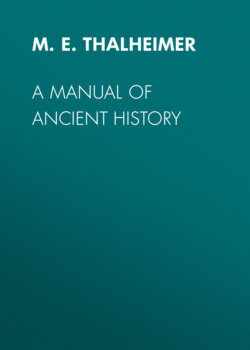Читать книгу A Manual of Ancient History - M. E. Thalheimer - Страница 30
На сайте Литреса книга снята с продажи.
ОглавлениеBC 634–632.
111. The end of Josiah’s reign was marked by two great calamities. A wild horde of Scythians,[11] from the northern steppes, swept over the land, carrying off flocks and herds. They advanced as far as As´calon, on the south-western coast, where they plundered the temple of Astarte, and were then induced to retire by the bribes of the king of Egypt. One trace of their incursion remained a thousand years, in the new name of the old city Bethshan, on the plain of Esdrae´lon. It was named by the Greeks Scythopolis, or the city of the Scythians. This was the first eruption of northern barbarians upon the old and civilized nations of southern Asia and Europe. Later events in the same series will occupy a large portion of our history.
BC 609.
112. The other and greater calamity of Josiah’s reign arose from a different quarter. Necho, king of Egypt, had become alarmed by the growth of Babylonian power, and was marching northward with a great army. Though in no way the object of his hostility, Josiah imprudently went forth to meet him, hoping to arrest his progress in the plain of Esdraelon. The battle of Megid´do followed, and Josiah was slain. Never had so great a sorrow befallen the Jewish people. The prophet Jeremiah, a friend and companion of Josiah from his youth, bewailed the nation’s loss in his most bitter “Lamentation”: “The breath of our nostrils, the anointed of the Lord, was taken in their pits, of whom we said, Under his shadow we shall live among the heathen.” For more than a hundred years the anniversary of the fatal day was observed as a time of mourning in every family.
113. In the reign of Jehoiakim, son of Josiah, Nebuchadnezzar, prince of Babylon, gained a great victory[12] over Necho, and extended his father’s kingdom to the frontier of Egypt. Jehoiakim submitted to be absorbed into the empire, but afterward revolted and was put to death.
Jehoiachin, his son, was made king; but, three months after his accession, was carried captive to Babylon. Zedeki´ah, reigning at Jerusalem, rebelled and allied himself with Apries, king of Egypt. Upon this, the ever active Nebuchadnezzar laid siege to the revolted city. In the second year it was taken and destroyed; the king and the whole nation, with the treasures of the temple and palace, were conveyed to Babylon, and the history of the Jews ceased for seventy years.
